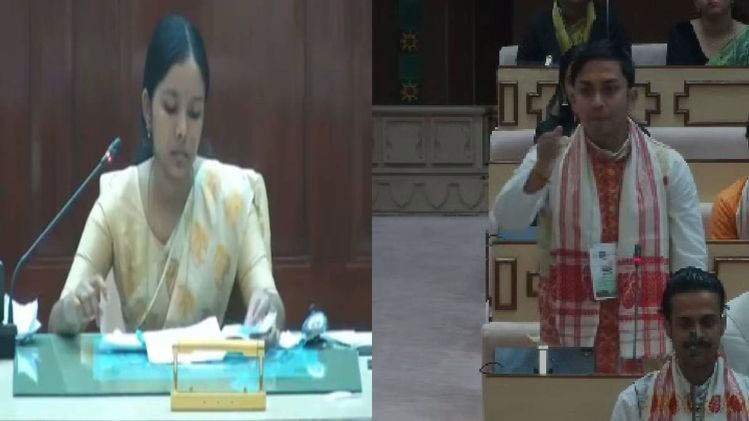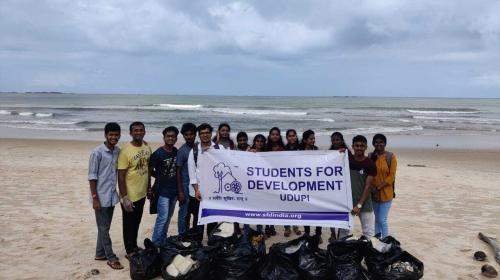Guwahati, Assam – Five exceptional students from Guwahati represented Assam at the National Environment Youth Parliament (NEYP) 2025, held on January 24-25 at the Vidhan Sabha in Jaipur, Rajasthan. The event provided a prestigious platform for young minds to discuss, deliberate, and propose solutions for pressing environmental issues that impact India and the world.
The proud participants from Guwahati included Rahul Rohan Paul and Arunima Dutta from Gauhati University, Kuhelika Saha from Cotton University, and Akshita Sharma and Elina Singha from B. Borooah College (affiliated with Gauhati University). These dedicated individuals actively participated in policy discussions, highlighting Assam’s role in climate resilience, biodiversity conservation, and sustainable development.
Apart from the Guwahati delegation, two more students from Assam—Raj Kamal Phukan and Kunal Agarwal from Dibrugarh University—also attended the event, marking a significant moment for Assam’s youth on the national stage.
The Significance of NEYP 2025: Why It Matters
The National Environment Youth Parliament (NEYP) is a highly regarded event that brings together youth leaders, policymakers, environmentalists, and academicians from across India. The forum is designed to empower young minds by engaging them in policy-driven discussions on climate change, renewable energy, environmental justice, and sustainability.
Organized by Students for Development (SFD) in collaboration with Paryavaran Sanrakshan Gatividhi and other environmental organizations, the event featured panel discussions, expert-led seminars, and high-level debates. The core objective was to promote youth participation in environmental policy-making and to develop leadership and decision-making skills that can shape India’s green future.
This year’s NEYP 2025 focused on key issues such as:
- Climate Change and Disaster Preparedness
- Biodiversity Conservation and Wildlife Protection
- Renewable Energy and Sustainable Urban Development
- Water Conservation and River Ecosystem Restoration
- Sustainable Agriculture and Food Security
The event was not just about discussions—it was about creating real, actionable solutions that can influence national policies and grassroots environmental movements.

Engaging in Meaningful Environmental Discussions
One of the key highlights of NEYP 2025 was the platform it provided for students to present their insights and research-based solutions for India’s growing environmental challenges.
The Guwahati delegation actively contributed to debates and panel discussions, sharing perspectives on how Assam’s environmental landscape is evolving and what policies should be implemented to preserve its unique biodiversity.
During the discussions, topics such as the Brahmaputra River’s vulnerability to climate change, deforestation in the Northeast, and the protection of Assam’s wildlife reserves were addressed. Participants from Guwahati emphasized the need for stronger legislative measures and community-driven conservation projects to protect the state’s rich ecological heritage.
How NEYP Prepares Students for Leadership Roles
The event helped students develop practical skills essential for leadership roles, including:
- Public Speaking & Debate Skills – Aspirants were trained in articulating their viewpoints with clarity and confidence, an essential trait for future policymakers and administrators.
- Networking & Collaboration – The platform allowed students to interact with government officials, environmentalists, and fellow participants, fostering long-term professional connections.
- Critical Thinking & Policy Making – Through engaging discussions, students learned how to analyze policy gaps and propose concrete solutions, bridging the gap between theory and implementation.
- Teamwork & Decision-Making – The forum encouraged teamwork, where students worked together to draft policy recommendations on climate resilience and sustainable development.
These skill-building exercises made NEYP 2025 more than just a conference—it was a stepping stone for future leaders.
Assam’s Role in Climate Conservation: The Need for Awareness
Assam is home to some of India’s most diverse ecosystems, including Kaziranga National Park, Dibru-Saikhowa National Park, Manas Wildlife Sanctuary, and the Brahmaputra River basin. However, rapid urbanization, deforestation, and climate change have posed significant threats to its environment.

The NEYP 2025 delegates from Guwahati highlighted the following pressing concerns regarding Assam’s environment:
- The Brahmaputra River’s Changing Course – Increased glacial melting and erratic monsoon patterns have led to unpredictable flooding and erosion, threatening communities along the riverbanks.
- Deforestation in the Northeast – Large-scale deforestation for agriculture and infrastructure development is putting pressure on Assam’s wildlife corridors and forest cover.
- Illegal Wildlife Trade & Poaching – Assam’s one-horned rhinoceros and elephant populations remain vulnerable to poaching and illegal wildlife trade, requiring stricter law enforcement.
- Sustainable Tea Plantation Practices – Assam’s tea industry, one of the largest in the world, needs to adopt more eco-friendly agricultural methods to reduce deforestation and pesticide pollution.
These issues were at the forefront of discussions at NEYP 2025, reinforcing Assam’s crucial role in India’s environmental future.
Building a Stronger Environmental Movement in Assam
To further Assam’s commitment to sustainability, the delegates emphasized the need for awareness programs, policy changes, and youth-driven initiatives. Some of their proposed solutions included:
- Strengthening Eco-Tourism Initiatives – Promoting eco-friendly tourism in Assam’s wildlife sanctuaries to generate funds for conservation.
- Encouraging Community Participation – Launching grassroots movements that empower local communities to protect forests and water bodies.
- Integrating Green Policies in Educational Curricula – Adding environmental studies as a mandatory subject in Assamese schools and colleges.
- Strict Implementation of Conservation Laws – Ensuring that policies against illegal deforestation, poaching, and water pollution are effectively enforced.
These recommendations were well received at NEYP 2025, positioning Assam as a leader in youth-driven environmental advocacy.

Conclusion: A Milestone Moment for Guwahati’s Youth
The participation of Guwahati’s five bright students at NEYP 2025 marked an important step in Assam’s growing role in national environmental policymaking. Their insights, research, and enthusiasm showcased Assam’s commitment to sustainable development, wildlife conservation, and climate action.
Guwahati has steadily emerged as a center for environmental awareness and activism, with students, researchers, and organizations working toward sustainable development. The city hosts several eco-awareness programs, clean-up drives, and climate action workshops, encouraging youth participation in conservation efforts. Educational institutions in Guwahati have also played a pivotal role in promoting climate literacy, ensuring students are well-versed in the impact of environmental changes on Assam’s biodiversity. With events like NEYP 2025, Guwahati’s youth are not only representing the city at national forums but also bringing back valuable insights to implement local solutions for global challenges.
Apart from academic initiatives, Guwahati’s growing eco-conscious community has contributed to several sustainability projects, including riverbank restoration, urban afforestation, and wetland conservation. Organizations based in Guwahati frequently collaborate with environmental researchers, government agencies, and policymakers to strengthen the city’s green policies. With the participation of Guwahati’s students at NEYP 2025, the city has once again proven its dedication to fostering environmentally responsible leadership. The contributions of these young leaders will undoubtedly inspire more students from Guwahati to actively participate in shaping India’s environmental future.
By engaging in meaningful environmental discussions, networking with experts, and proposing innovative solutions, these students have taken a significant step toward becoming future environmental leaders.
The NEYP 2025 experience will undoubtedly shape their careers and perspectives, inspiring them to continue working toward a greener, more sustainable future for Assam and beyond.












